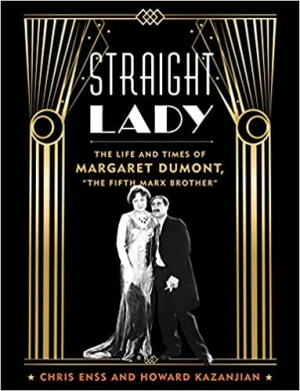Straight Lady
The Life and Times of Margaret Dumont, "The Fifth Marx Brother"
- 2022 INDIES Winner
- Honorable Mention, Performing Arts & Music (Adult Nonfiction)
Straight Lady is the untold story of an iconic, underappreciated talent who helped to shape early Hollywood comedies.
Chris Enss and Howard Kazanjian’s Straight Lady is the biography of Margaret Dumont, best known for playing opposite the Marx Brothers.
Dumont spent most of her life performing onstage and on-screen, yet she was best known—then and now—for her role in various Marx Brothers pictures. Born Daisy Baker, she began her career in vaudeville, left the stage to marry a wealthy man with whom she stayed until his premature death, and returned to acting just in time to join the Marx Brothers in their career-launching play The Cocoanuts. Though her name is not as familiar as those of Groucho, Chico, and Harpo, critics have long recognized how indispensable she was to their longevity and success.
Enss and Kazanjian cover Dumont’s career as a study in contrasts. She performed in both vaudeville and regular theater productions at the turn of the century. She made her name as a singer, dancer, and comedian, but she didn’t achieve widespread fame until she assumed the role of the ever-dignified straight woman, smoothing out the Marx Brothers’ signature madcap humor. The Marxes subjected her to a series of outrageous, sometimes cruel pranks off-screen and on, yet Dumont remained loyal and professional, even stating that they were her closest friends.
But the book notes that Dumont performed the role of haughty society lady so well that she became typecast. She expressed mixed feelings about this to the press, but maintained her poise both on- and off-screen. Dumont was, as ever, a fixed point in a world of chaos. It all makes for a tantalizing story.
Photographs of Dumont throughout her career, including in the roles she played before and after her time with the Marxes, are included. Of particular interest are the more obscure photographs in which young Dumont poses for publicity or acts in plays long before achieving her immortality on film.
Still, the book relies a great deal on contemporary newspaper reviews of Dumont’s performances and reports about her life and the films she worked on. Dumont’s own voice is, aside from quoted interviews, absent. After the first few chapters, which relay the surprising scandals that she became embroiled in at the dawn of her career, the book focuses more on the Marx Brothers’ films, and the Marxes themselves, than on Dumont. Her personal feelings, life, and relationships during this period remain in the shadows; she is relegated to supporting character status in her own biography.
Straight Lady is the untold story of an iconic, underappreciated talent who helped to shape early Hollywood comedies.
Reviewed by
Eileen Gonzalez
Disclosure: This article is not an endorsement, but a review. The publisher of this book provided free copies of the book and paid a small fee to have their book reviewed by a professional reviewer. Foreword Reviews and Clarion Reviews make no guarantee that the publisher will receive a positive review. Foreword Magazine, Inc. is disclosing this in accordance with the Federal Trade Commission’s 16 CFR, Part 255.

